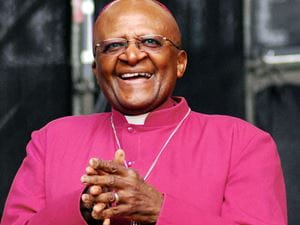
The year is 1943, and South Africa is on the verge of the system of legislated racial segregation known as apartheid, wherein nonwhite South Africans will be forced to live in separate areas from whites. Blacks will then be further separated into distinct “tribes,” in order to further weaken their political power.
They were torn from their homes and herded into territories designated for blacks, known as Bantustans, where millions of people lived in squalor and were forced to seek employment as “guest workers” in South Africa proper in order to support themselves.
Even before being so drastically enforced, white supremacy had been a central aspect of South African policy and culture, despite blacks being the numerical majority in the country—the racial tensions stretch back all the way to the 1700s. More and more acts were passed which disenfranchised, separated, and oppressed the black population of South Africa, culminating in a structured segregation policy in 1948--apartheid. The misery didn’t end until 1994.
The enforced segregation was not without its opponents, both violent and peaceful. The years following were rife with uprisings, militarization of the resistance, and violent unrest.
One man, however, never gave in to the burning anger that oppressors create in their victims. One man didn’t give in to the cycle of violence. Instead, he mediated, leading a successful diplomatic assault on apartheid. And through it all, he never lost his sense of humor, or his small, wry smile.
That man is Desmond Tutu.
When Desmond Tutu was twelve years old, his family moved to Johannesburg, South Africa, where, for the very first time, he witnessed a white man take off his hat in respect toward his black mother.
“I couldn’t believe my eyes,” says Tutu of the event, “a white man who greeted a black working class woman!”
It was in such moments of empathy that Tutu found his calling.
Originally accepted into medical school, Tutu found that his family was unable to afford the training, and so he became a teacher, as his father was, studying at the Pretoria Bantu Normal College from 1951 to 1953. Afterward, he went on to teach at Johannesburg Bantu and Munsienville high schools in Mogale City.
The Bantu Education Act of 1953 ended Tutu’s teaching career—at least as far as high school was concerned. The act was a legal aspect of the apartheid system, and enforced racially separated school facilities. Most schools which were designated as “tribal,” now unfunded by the government, closed down. These schools, designated for blacks, often lacked basic necessities such as running water and electricity.
Unable to continue participating in an educational system designed to promote inequality, Tutu ended his teaching career, deciding, instead, that he could better serve his people through the church.
In 1958, he began studying at St. Peter’s Theological College in Johannesburg, and was ordained as an Anglican deacon in 1960, and then as a priest in 1961. After, Tutu pursued further education in London, earning a master’s of theology from King’s College in 1966.
Desmond Tutu began to truly take hold of his calling when he became the first black Anglican Dean of Johannesburg in 1975. This provided the platform that Tutu would use to become one of the most powerful opponents of the apartheid. Of this, Tutu says, "I realized that I had been given a platform that was not readily available to many blacks and most of our leaders were either now in chains or in exile. And I said, 'Well, I'm going to use this to seek to try to articulate our aspirations and the anguishes of our people.’"
And so he did.
Tutu continued to rise through the South African religious hierarchy, just as he continued to call for an end to apartheid. His life was marked by a rare sort of optimism, an indomitable and heroic spirit that could not be quelled. He “never doubted that ultimately we were going to be free, because ultimately I knew there was no way in which a lie could prevail over the truth, darkness over light, death over life.”
In 1984, Desmond Tutu became the first South African recipient of the Nobel Peace Prize since 1961, taking the anti-apartheid movement from a local concern to international attention. “It opened doors,” Tutu says of the award. Not only this, but it elevated Tutu to the status of one of the world’s leading moral voices. It gave him visibility, which he continued to use to full effect.
In 1985, Tutu became the first black Archbishop of Cape Town—the highest position in the South African Anglican Church. With all the weight of the church behind him, Archbishop Tutu helped guide South Africa through eloquent speech wisdom, and unfailing optimism, until finally, in 1994, South African apartheid came to an end.
But what was different about Archbishop Desmond Tutu? What did he offer that other anti-apartheid leaders did not, that the rest of the world could not?
Desmond Tutu’s legacy is one not of war, but of true forgiveness, and reconciliation—the rarest of things.
Tutu’s opposition to apartheid was unequivocal. He was outspoken concerning its evils, and the hardships that segregation places upon oppressed people groups, comparing apartheid to Nazism. But his advocacy of non-violence set him apart, and protected him from the harsher penalties brought down upon the heads of other anti-apartheid leaders. He, in fact, denounced terrorism against the oppressive South African government in all its forms.
Perhaps greatest of all are his teachings on forgiveness, of which he often speaks. Tutu defines forgiveness as “abandoning my right revenge, to payback”. When that right is abandoned, when that resentment is let go, the relationship between oppressor and oppressed can be restored, and a people can become one.
To many of us, this is an utterly foreign concept. We live in a “them” world rather than an “us” world, and enemies are for destroying, not loving. But Tutu shows a greater truth—forgiving our enemies, even after a bitter fight against their wrongs, is the only way to true peace. To see the effectiveness of this worldview, one has only to look at South Africa today—a very different place than it was a few decades ago, largely thanks to Tutu’s moral iron-strong moral guidance.
“Forgive one another as God, Himself, forgave you,” says Tutu. “That’s the standard.”
And it is a high standard, indeed—one that we can all learn from, regardless of faith or creed. Humans, individually, or in groups, will make mistakes. We always will, and sometimes those mistakes will be grievous. But by fostering a culture of forgiveness, even as we correct evil deeds, we stop the cycle that perpetuates those evil deeds. We seek not only justice, but justice and love—the two, the Archbishop has found, are inseparable.
And that is the legacy of Desmond Tutu.

